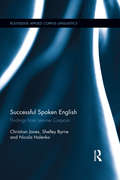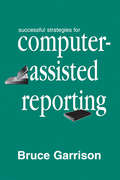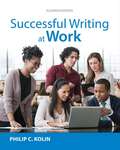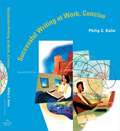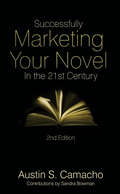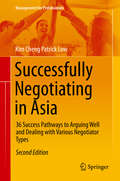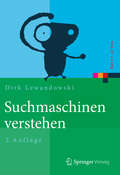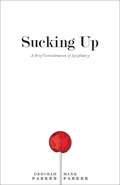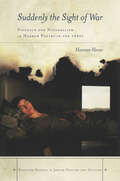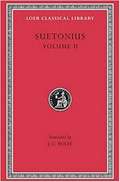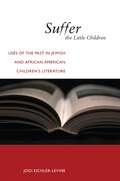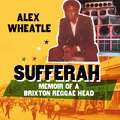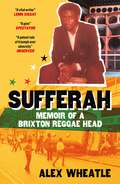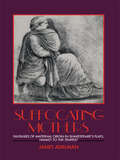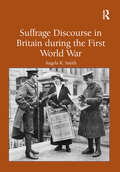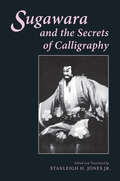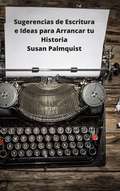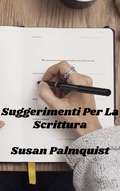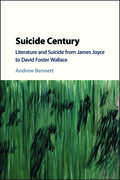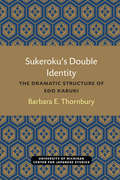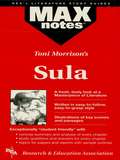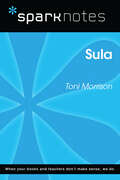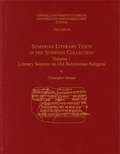- Table View
- List View
Successful Spoken English: Findings from Learner Corpora (Routledge Applied Corpus Linguistics)
by Christian Jones Shelley Byrne Nicola HalenkoSuccessful Spoken English demonstrates how spoken learner corpora can be used to define and explore the constituents of successful spoken English. Taking the approach that language learners can speak effectively whilst still using some non-standard forms, this book: Examines databases of transcribed speech from learners at each different CEFR level to analyse what makes a successful speaker of English; Discusses features of communicative competence, including the use of linguistic strategies, organisation of extended stretches of speech, and sensitivity to context; Demonstrates quantitative and qualitative data analysis using corpus tools, looking at areas such as word frequency; Helps to reassess the goals of language learners and teachers, and provides recommendations for teaching practice and for further research. Successful Spoken English is key reading for postgraduate students of TESOL and Applied Linguistics, as well as for pre- and in-service English language teachers.
Successful Strategies for Computer-assisted Reporting (Routledge Communication Series)
by Bruce GarrisonComputers have changed the landscape of both gathering and disseminating information throughout the world. As journalists quickly move toward the 21st century and perhaps, a new era of electronic journalism, resources are needed to understand the newest and most successful computer-based news reporting strategies. Written to serve that purpose, this book is designed to show both professional journalists and students which of the newest personal computing tools are being used by the nation's leading news organizations and top individual journalists. It further describes how these resources are being used on a daily basis and for special projects. In recent years, computers have taken on new and dominating roles in the process of news analysis, newsgathering, and news processing. Today's forward-thinking journalists often seek guidance over what they can do to strengthen their ability to be society's information processors and managers. This volume focuses upon how successful journalists are using computers through a major national computer-assisted reporting (CAR) study of daily newspapers. The study included two national surveys and a series of personal interviews with many of the nation's leading CAR specialists. Several current examples of stories used for successful database- and online-oriented news assignments are provided as part of a series of case studies incorporated throughout the book. The additional depth of description and the presentation of portions of stories themselves should help readers to understand the complete process involving CAR-oriented journalism. Substantial analytical detail is used to discuss the extent of computer use in newsrooms, computer training, CAR projects, CAR in daily reporting, hardware and software most commonly used, levels and types of online services used in news research, and portable hardware and software. The book concludes with the author's assessment of the effects and impact of personal computing in the newsroom and the future of personal computer applications in newsgathering. Explaining and defining advanced applications or terminology for readers, the approach to the book assumes a minimal familiarity with computers, but no advanced knowledge of computer operation.
Successful Writing At Work (with 2016 MLA Update Card, Eleventh Edition)
by Philip KolinSUCCESSFUL WRITING AT WORK, 11th Edition, is a comprehensive introduction to workplace writing with real-world examples and problems; an easy-to-read style; and thorough guidelines for planning, drafting, revising, editing, formatting, and producing professional documents in the global workplace. After a discussion of the writing process and collaboration, the author explores basic business communications (including e-communications and social media), letters, resumes, and other job search materials; proceeds to how to conduct research and document sources; and ends with guidance on more advanced tasks such as preparing visuals, websites, instructions, procedures, proposals, short and long reports, and presentations. You will learn how to be an effective problem solver at work, understand and write for a global audience, write clear and effective sentences, paragraphs, and documents, and select the best communication technologies to accomplish your goals. Each student text is packaged with a free Cengage Essential Reference Card to the MLA HANDBOOK, Eighth Edition.
Successful Writing at Work (Concise Edition)
by Philip C. KolinThis user-friendly, compact text presents the most necessary, useful skills and strategies for successful workplace writing. Based on the successful parent text, Successful Writing at Work, 8/e, the Concise Edition maintains a practical approach, an abundance of realistic situations and problems, real-world examples, and detailed guidelines for drafting, editing, and producing professional documents and graphics. The Second Edition features a contemporary, open, and user-friendly design, including a wider trim size to allow for marginal note-taking and many new and up-to-date visuals.
Successfully Marketing Your Novel in the 21st Century
by Austin Camacho Sandra BowmanThe rise of e-books, loss of bookstores, disappearance of the big publishers' midlists, improvements in self-publishing technology and the advent of social media have turned the book business on its head. One thing has remained the same. Novels must be promoted and marketed if an audience is to find them. Although it has never been easier to get a book published, it has also never been harder to get a book sold. Providing guidelines on how to drive book sales to a whole new level, this up-to-date book is crammed with tips and tricks of the book trade gathered from the authors' own experiences as an author.
Successfully Negotiating in Asia: 36 Success Pathways to Arguing Well and Dealing with Various Negotiator Types (Management for Professionals)
by Kim Cheng LowSuccessful negotiation requires understanding your counterpart’s culture, their feelings, habits and values. When planning to do business with suppliers and other partners in Asia, thorough preparation is essential in order to avoid misunderstandings, confrontations and disappointments, and to ensure the mutually desired success. This book offers a comprehensive guide to communication, argumentation, and negotiation by demonstrating success pathways with a focus on specific types of negotiator or negotiation partner from the different regions of the Asian continent. Readers will learn to negotiate the Chinese, the Indian and the Japanese way, and come to understand how Asians approach negotiations. Written by a truly international author, both academic and practitioner, with extensive experience in both Eastern and Western cultures, this book offers a valuable resource for anyone who relies on successfully negotiating with Asian partners.
Suchmaschinen verstehen (Xpert. Press Ser.)
by Dirk LewandowskiSuchmaschinen sind heute die wichtigsten Werkzeuge, um an Informationen zu gelangen. Wir verwenden Suchmaschinen täglich, meist ohne weiter darüber nachzudenken. Doch wie funktionieren diese Suchwerkzeuge eigentlich genau? Das Buch betrachtet Suchmaschinen aus vier Perspektiven: Technik, Nutzung, Recherche und gesellschaftliche Bedeutung. Es bietet eine klar strukturierte und verständliche Einführung in die Thematik. Zahlreiche Abbildungen erlauben eine schnelle Erfassung des Stoffs.Neben einer ausführlichen Darstellung der in den bekannten Suchmaschinen verwendeten Rankingverfahren wird auch ausführlich auf das Nutzerverhalten eingegangen, das wiederum die Ergebnisdarstellung prägt. Dazu kommen grundlegende Betrachtungen des Suchmaschinenmarktes, der Bedeutung der Suchmaschinenoptimierung und der Rolle der Suchmaschinen als technische Informationsvermittler. Das Buch richtet sich an alle, die mit Suchmaschinen zu tun haben und ein umfassendes Verständnis dieser Suchwerkzeuge erlangen wollen, u.a. Suchmaschinenoptimierer, Entwickler, Informationswissenschaftler, Bibliothekare, Rechercheure in Wissenschaft und Praxis sowie Online-Marketing-Verantwortliche.Für die zweite Auflage wurde der Text vollständig überarbeitet. Neben einem neuen Kapitel zur Suchmaschinenwerbung wurden zahlreiche Abschnitte zu neu aufgekommenen Themen hinzugefügt. Alle Statistiken und Quellen wurden auf den neuesten Stand gebracht.Aus Rezensionen zur ersten Auflage:„Dirk Lewandowski bringt den Fachleuten und Laien näher, was im Hintergrund der Suchmaschine abläuft und wie die Suchergebnisse zustande kommen.“ (Stephan Holländer in Password) „Dirk Lewandowski [...] hat einerseits das Fachwissen, sowohl in die Tiefe zu gehen als auch die Zusammenhänge so verständlich wie möglich zu behandeln. Ein Glücksfall!“ (Jürgen Plieninger in BuB)
Sucking Up: A Brief Consideration of Sycophancy
by Mark ParkerSuck-up. Ass-kisser. Brownnoser. Bootlicker. Lickspittle. Toadeater... Found in every walk of life, both real and imagined, sycophants surround us. But whether we grumble about sycophancy or grudgingly tolerate it as a price of getting along in a complex society, we rarely examine it closely. This book humorously considers that slavish art from the historical past to our current political environment, and particularly through the revealing lens of literature. Some of the grandest examples of yes-men appear in these pages--from Dante’s flatterers and Dickens’s Uriah Heep to Kellyanne Conway, who urged us to "go buy Ivanka’s stuff," and the obsequious soul who apologized to Vice President Cheney for being shot by him.More relevant now than ever, as sucking up becomes the master trope of the Trump era, this choice romp through the spectacular world of bowing and scraping will entertain and enlighten.
Suddenly, the Sight of War: Violence and Nationalism in Hebrew Poetry in the 1940s
by Hannan Hever translated by Lisa KatzSuddenly, the Sight of War is a genealogy of Hebrew poetry written in Israel between the beginning of World War II and the War of Independence in 1948. In it, renowned literary scholar Hannan Hever sheds light on how the views and poetic practices of poets changed as they became aware of the extreme violence in Europe toward the Jews. In dealing with the difficult topics of the Shoah, Natan Alterman's 1944 publication of The Poems of the Ten Plagues proved pivotal. His work inspired the next generation of poets like Haim Guri, as well as detractors like Amir Gilboa. Suddenly, the Sight of War also explores the relations between the poetry of the struggle for national independence and the genre of war-reportage, uniquely prevalent at the time. Hever concludes his genealogy with a focus on the feminine reaction to the War of Independence showing how women writers such as Lea Goldberg and Yocheved Bat-Miryam subverted war poetry at the end of the 1940s. Through the work of these remarkable poets, we learn how a culture transcended seemingly unspeakable violence.
Suetonius, Volume II (The Loeb Classical Library #38)
by Suetonius J. C. Rolfe<p>Suetonius (C. Suetonius Tranquillus, born ca. 70 CE), son of a military tribune, was at first an advocate and a teacher of rhetoric, but later became the emperor Hadrian's private secretary, 119-121. He dedicated to C. Septicius Clarus, prefect of the praetorian guard, his Lives of the Caesars. After the dismissal of both men for some breach of court etiquette, Suetonius apparently retired and probably continued his writing. His other works, many known by title, are now lost except for part of the Lives of Illustrious Men (of letters). <p>Friend of Pliny the Younger, Suetonius was a studious and careful collector of facts, so that the extant lives of the emperors (including Julius Caesar the dictator) to Domitian are invaluable. His plan in Lives of the Caesars is: the emperor's family and early years; public and private life; death. We find many anecdotes, much gossip of the imperial court, and various details of character and personal appearance. Suetonius's account of Nero's death is justly famous. <p>The Loeb Classical Library edition of Suetonius is in two volumes. Both volumes were revised throughout in 1997-98, and a new Introduction added.</p>
Suffer the Little Children: Uses of the Past in Jewish and African American Children's Literature (North American Religions)
by Jodi Eichler-LevineExamines classic and contemporary Jewish and African American children’s literatureThrough close readings of selected titles published since 1945, Jodi Eichler-Levine analyzes what is at stake in portraying religious history for young people, particularly when the histories in question are traumatic ones. In the wake of the Holocaust and lynchings, of the Middle Passage and flight from Eastern Europe's pogroms, children’s literature provides diverse and complicated responses to the challenge of representing difficultcollective pasts.In reading the work of various prominent authors, including Maurice Sendak, Julius Lester, Jane Yolen, Sydney Taylor, and Virginia Hamilton, Eichler-Levine changes our understanding of North American religions. She illuminates how narratives of both suffering and nostalgia graft future citizens into ideals of American liberal democracy, and into religious communities that can be understood according to recognizable notions of reading, domestic respectability, and national sacrifice. If children are the idealized recipients of the past, what does it mean to tell tales of suffering to children, and can we imagine modes of memory that move past utopian notions of children as our future? Suffer the Little Children asks readers to alter their worldviews about children’s literature as an “innocent” enterprise, revisiting the genre in a darker and more unsettled light.
Sufferah: Memoir of a Brixton Reggae Head
by Alex WheatleIn this breathtaking memoir, acclaimed writer Alex Wheatle shows how music became his salvation through a childhood marred by abuse and his imprisonment as a young man protesting against systemic racism and police brutality.Abandoned as a baby to the British care system, Alex Wheatle grows up with no knowledge of his Jamaican parentage or family history. Later, he is inexorably drawn to reggae, his lifeline through disrupted teenage years and the challenges of living as a young Black man in 1980s Britain.Alex's youth was portrayed in Oscar Award-winning director Steve McQueen's "Small Axe" series (2020). In Sufferah, he tells his own story urgently, vividly and unsentimentally. His award-winning fiction - and this memoir - are a call to never give up hope. Sufferah reminds us that words can be our sustenance, and music our heartbeat."Alex Wheatle is an inspirer. He sheds light in dark places . . . He is a vital writer" LEMN SISSAY"Alex Wheatle is the real deal; he writes with heart and authenticity, books that make you laugh and worry and cry and hold your breath" KIT DE WAAL"Alex Wheatle writes from a place of honesty and passion" STEVE McQUEEN, director of Small Axe(P)2023 Quercus Editions Limited
Sufferah: Memoir of a Brixton Reggae Head
by Alex Wheatle"One of the big memoirs of the summer" i news"Alex is a truly gifted storyteller, and the way he details his own story here is no exception" JEFFREY BOAKYE In this breathtaking memoir, acclaimed writer Alex Wheatle shows how music became his salvation through a childhood marred by abuse.Abandoned as a baby to the British care system, Alex grows up with no knowledge of his Jamaican parentage or family history. Later, he is inexorably drawn to reggae, his lifeline through disrupted teenage years, the challenges of living as a young Black man in 1980s Britain and his imprisonment for protesting against systemic racism and police brutality.Alex's youth was portrayed in Oscar Award-winning director Steve McQueen's Small Axe series. In Sufferah, he tells his own story, urgently, vividly and unsentimentally. His award-winning fiction - and this memoir - are a call to never give up hope. They remind us that words can be our sustenance, and music our heartbeat. "Alex Wheatle is the real deal; he writes with heart and authenticity, books that make you laugh and worry and cry and hold your breath" KIT DE WAAL"Alex Wheatle is an inspirer. He sheds light in dark places . . . He is a vital writer" LEMN SISSAY"Alex Wheatle writes from a place of honesty and passion" STEVE McQUEEN, director of Small Axe
Suffocating Mothers: Fantasies of Maternal Origin in Shakespeare's Plays, Hamlet to the Tempest
by Janet AdelmanAn original reading of Shakespeare's plays illuminating his negotiations with mothers, present and absent, and tracing the genesis of Shakespearean tragedy and romance to a psychologized version of the Fall.
Suffrage Discourse in Britain during the First World War
by Angela K. SmithIn the first in-depth study of the relationship between the suffrage campaign in Britain and World War I, Angela K. Smith explores the links between these two defining moments of the early twentieth century. Did the opportunities afforded by the war enable women finally and irrefutably to demonstrate their right to full citizenship? Or did World War I actually postpone women's enfranchisement? Although the Suffrage Movement was divided by the outbreak of war, many women continued to campaign for the vote, producing a wide variety of fictional and nonfictional 'suffrage texts'. Whether the writing of these women demonstrated their patriotism, pacifism, or ambivalence, it formed an integral part of their political responses to the war. Through textual/literary analysis of Suffrage magazines, wartime diaries, and a range of topical novels, Smith explores these responses within historical, social, and cultural contexts to understand the impact of the war on the success of the campaign in 1918 and the consequences for the years that followed.
Sugam Marathi Vyakaran va Lekhan Second Semester FYBA New NEP Syllabus - RTMNU: सुगम मराठी व्याकरण व लेखन दुसरे सत्र एफ.वाय.बी.ए. नवीन एन.इ.पी. अभ्यासक्रम - राष्ट्रसंत तुकडोजी महाराज नागपूर विद्यापीठ
by M. R. Valambe‘शब्दरत्न सह सुगम मराठी व्याकरण व लेखन’ हे मो. रा. वाळंबे यांचे पुस्तक माध्यमिक, उच्च माध्यमिक, पदवीपूर्व तसेच स्पर्धा परीक्षांसाठी व्याकरण व लेखन या विषयांवर आधारित एक सविस्तर व सुलभ मार्गदर्शक आहे. या पुस्तकात मराठी भाषेचे मूलतत्त्व, वर्ण, संधी, समास, वाक्यरचना, वृत्त, अलंकार, रसग्रहण, लेखन कौशल्ये यांचे अभ्यासक्रमानुरूप विवेचन केलेले आहे. प्रत्येक प्रकरणानंतर स्वमूल्यांकनासाठी वस्तुनिष्ठ प्रश्न व उत्तरे, तसेच लेखन विभागात निबंध, भाषांतर, पत्रलेखन व सारांशलेखनाचे मार्गदर्शन दिले आहे. ‘शब्दरत्न’ या सहपुस्तकात वाक्प्रचार, म्हणी, समानार्थी-विरुद्धार्थी शब्दांचा संग्रह असून त्यांचा वापर स्पष्ट उदाहरणांसह दिला आहे. सोप्या भाषेत सखोल अभ्यास करून विद्यार्थ्यांमध्ये व्याकरणाची गोडी निर्माण करणे हेच या पुस्तकाचे मुख्य वैशिष्ट्य आहे.
Sugam Marathi Vyakaran va Lekhan Shabdratna FYBA New NEP Syllabus - RTMNU: सुगम मराठी व्याकरण व लेखन शब्दरत्न एफ.वाय.बी.ए. नवीन एन.इ.पी. अभ्यासक्रम - राष्ट्रसंत तुकडोजी महाराज नागपूर विद्यापीठ
by M. R. Valambeसुगम मराठी व्याकरण व लेखन - शब्दरत्न हे मो. रा. वाळंबे लिखित पुस्तक मराठी भाषेचे व्याकरण आणि शब्दसंपदेचा समग्र अभ्यास करणारे एक उपयुक्त साधन आहे. विद्यार्थ्यांपासून ते शिक्षक, स्पर्धा परीक्षा उमेदवार आणि भाषा अभ्यासकांसाठी हे पुस्तक मार्गदर्शक ठरते. या ग्रंथात समानार्थी शब्द, विरुद्धार्थी शब्द, वाक्प्रचार, म्हणी, शब्दसमूहाबद्दल एक शब्द, अलंकारिक शब्द, पारिभाषिक शब्द व तत्सम-तद्भव शब्द यांचे सविस्तर संकलन अकारविल्हेक्रमानुसार मांडलेले आहे. वाक्यरचनेतील सौंदर्य, भाषेतील गोडवा आणि भाषिक अभिव्यक्तीचा कस अशा विविध अंगांनी शब्दवैभव सादर केले आहे. विद्यार्थी परीक्षेत उत्तम गुण मिळवण्यासाठी तसेच मराठी भाषेवर प्रभुत्व मिळवण्यासाठी या शब्दरत्नाचा उपयोग करू शकतात. यामध्ये ९०० पेक्षा अधिक म्हणी-वाक्प्रचार, वेगवेगळ्या बोलीभाषांतील म्हणी आणि इंग्रजी-मराठी म्हणींची तुलना करून भाषिक समृद्धी साधली आहे. शब्दांच्या सूक्ष्म भेदांपासून ते व्याकरणाच्या नियमांपर्यंतचा सखोल अभ्यास या पुस्तकात करता येतो. ‘शब्द हीच आपली खरी संपत्ती’ हा भाव मांडणारे हे पुस्तक मराठी भाषा शिकणाऱ्यांना शब्दांचे दालन खुले करून देणारे आहे.
Sugawara and the Secrets of Calligraphy (Translations from the Asian Classics)
by Stanleigh Jones Jr.Sugawara and the Secrets of Calligraphy is a classic play from Japan's golden age of puppet theater. Written in the eighteenth century, it tells the tale of Sugawara no Michizane, a wronged scholar-official who, in death, joins the Shinto pantheon as a nurturer of scholarship and calligraphy. The story recounts Sugawara's entanglement with the powerful Fujiwara family, who accuse Sugawara of plotting against the emperor, resulting in his exile and death in 903. After a series of misfortunes befall those who conspired against him, Sugawara's enemies appease his spirit through deification. Sugawara and the Secrets of Calligraphy centers on three archetypical brothers and their wives. Their fates unfold against the intrigues surrounding Sugawara and his foes, which reflect the cultural values of the Edo period woven into a stylized past. This annotated translation by Stanleigh H. Jones Jr. replicates the play's poetic and idiomatic language and its original mix of register while also clarifying the drama's complex story and dialogue for students of Japanese literature and drama. An introduction situates the play within its eighteenth-century context and ninth-century setting and describes the relationship between bunraku puppet theater and kabuki. A unique illustrated appendix delves into the construction of puppets and the art of puppetry.
Sugerencias de Escritura e Ideas para Arrancar tu Historia
by Susan Palmquist¿Alguna vez has querido escribir un ahistoria pero no sabes sobre qué escribir? Sugerencias de Escritura e Ideas es tu guía ideal, llena de ideas para comenzar. Gana muchas ideas para comenzar tu historia. Con doce capítulos llenos de fragmentos de historias y escenarios nunca jamás te faltarán las ideas. Nunca mires una página en blanco o un cursor parpadeante de nuevo. ¿Sueles sentarte y mirar una página en blanco o un cursor parpadeando esperando escribir sin saber sobre qué escribir? Que este libro sea tu guía de referencia para esas veces en las que tu musa está perdida en acción. Afila tus habilidades de escritura. ¿Tus habilidades de escritura están algo oxidadas? ¿Buscas un libro con ejercicios que puedan afinar tu historia corta o novela y tal vez darte un paso más a ser publicado?
Suggerimenti Per La Scrittura
by Susan PalmquistBenvenuto nel terzo dei libri sulla scrittura di testi di narrativa. Questo, in particolare, riguarderà esercizi, idee e suggerimenti che, se tutto va bene, serviranno a darti ispirazione. Insegno scrittura da circa cinque anni e molti studenti mi hanno detto che hanno difficoltà nell’inventare delle brevi storie e, di conseguenza, anche dei romanzi. Infatti, alcuni hanno perfino chiesto se potessi suggerire loro delle idee su quello che avrebbero dovuto scrivere. Mi ha fatto pensare che, forse, la mancanza di idee è la principale causa per cui molte persone, anche quelle che hanno il desiderio di scrivere un libro, non lo fanno. Quindi ho iniziato una pubblicazione settimanale sul mio blog, chiamato Monday Writing Prompts, e sono rimasta stupita dal numero di persone che avevano iniziato a seguirla. Infatti, era così popolare che mi ha dato l’idea per questo libro. In quest’ultimo, non troverai solo suggerimenti e idee, ma anche scenari per delle trame e frammenti di storie. C’è un capitolo in cui ti darò consigli su come iniziare, continuare e finire la tua storia. E ho perfino incluso un capitolo, che ammetto essere uno dei miei preferiti, riguardo strani giorni di festa. Quindi, se la tua ispirazione ha bisogno di un po’ di aiuto, iniziamo.
Suicide Century: Literature and Suicide from James Joyce to David Foster Wallace
by Andrew BennettSuicide Century investigates suicide as a prominent theme in twentieth-century and contemporary literature. Andrew Bennett argues that with the waning of religious and legal prohibitions on suicide in the eighteenth and nineteenth centuries and the increasing influence of medical and sociological accounts of its causes and significance in the twentieth century, literature responds to the act and idea as an increasingly normalised but incessantly baffling phenomenon. Discussing works by a number of major authors from the long twentieth century, the book explores the way that suicide makes and unmakes subjects, assumes and disrupts meaning, induces and resists empathy, and insists on and makes inconceivable our understanding of ourselves and of others.
Sukeroku’s Double Identity: The Dramatic Structure of Edo Kabuki (Michigan Papers in Japanese Studies #6)
by Barbara E. ThornburyThe aim of this book is to show that seemingly illogical double identity of the townsman, Sukeroku, and the samurai, Soga Goro, in the play Sukeroku is a surviving element of what was once a complex and coherent structure based on a traditional performance calendar. To show how the calendar function and what Sukeroku's double identity signifies, the book is divided into two parts. Part One studies the structure of Edo kabuki. The first chapter, which outlines that structure, is based for the most part on writings of the Tokugawa period. The second chapter then looks at the concepts of sekai, "tradition," and shuko, "innovation." Kabuki was the product of material that had become a familiar part of Japanese culture by repeated use and dramatization over long periods of time, starting before kabuki began, and material that was relatively new and was used to transform the older, set material. The double identity in Sukeroku came about as a result of this interplay between what was received by way of traditional and what was added by way of innovation. Part Two considers the significance of the double identity. The author concludes that Sukeroku's double identity gave Edo audiences a hero who was an idealization of the contemporary Tokugawa townsman and at the same time a transformation of a samurai god-hero of the past. The first chapter of Part Two traces the development of Sukeroku's Soga Goro/samurai identity, from its origins in the early dramatic forms of no, kowaka, and ko-joruri, to the representation of Soga Goro in kabuki by Ichikawa Danjuro I. The seconds then looks at the transformation of Soga Gorointo Sukeroku by discussing the origins of Sukeroku and its introductions to Edo kabuki by Ichikawa Danjuro I and his son, Danjuro II, since their work was the basis of all later developments.
Sula (MAXNotes Literature Guides)
by Anita Price DavisREA's MAXnotes for Toni Morrison's Sula MAXnotes offer a fresh look at masterpieces of literature, presented in a lively and interesting fashion. Written by literary experts who currently teach the subject, MAXnotes will enhance your understanding and enjoyment of the work. MAXnotes are designed to stimulate independent thought about the literary work by raising various issues and thought-provoking ideas and questions. MAXnotes cover the essentials of what one should know about each work, including an overall summary, character lists, an explanation and discussion of the plot, the work's historical context, illustrations to convey the mood of the work, and a biography of the author. Each section of the work is individually summarized and analyzed, and has study questions and answers.
Sula (SparkNotes Literature Guide Series)
by SparkNotesSula (SparkNotes Literature Guide) by Toni Morrison Making the reading experience fun! Created by Harvard students for students everywhere, SparkNotes is a new breed of study guide: smarter, better, faster. Geared to what today's students need to know, SparkNotes provides: *Chapter-by-chapter analysis *Explanations of key themes, motifs, and symbols *A review quiz and essay topicsLively and accessible, these guides are perfect for late-night studying and writing papers
Sumerian Literary Texts in the Schøyen Collection: Volume 1: Literary Sources on Old Babylonian Religion (CUSAS)
by Christopher MetcalfThe first in a series of volumes publishing the Sumerian literary texts in the Schøyen Collection, this book makes available, for the first time, editions of seventeen cuneiform tablets, dating to ca. 2000 BCE and containing works of Sumerian religious poetry. Edited, translated, and annotated by Christopher Metcalf, these poems shed light on the interaction between cult, scholarship, and scribal culture in Mesopotamia in the early second millennium BCE.The present volume contains fourteen songs composed in praise of the various gods of the Mesopotamian pantheon; it is believed that these songs were typically performed in temple cults. Among them are a song in praise of Sud, goddess of the ancient Mesopotamian city Shuruppak; a song describing the statue of the protective goddess Lamma-saga in the “Sacred City” temple complex at Girsu; and a previously unknown hymn dedicated to the creator god Enki. Each text is provided in transliteration and translation and accompanied by hand-copies and images of the tablets themselves.Expertly contextualizing each song in Babylonian religious and literary history, this thoroughly competent editio princeps will prove a valuable tool for scholars interested in the literary and religious traditions of ancient Mesopotamia.
